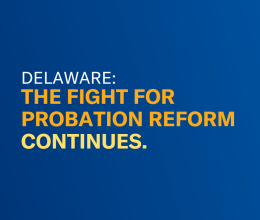By: Denise Dudley, ACLU-DE Smart Justice Ambassador
My name is Denise Dudley. I am the reigning Miss Delmarva 2025 and an ACLU-DE Smart Justice Ambassador, and I support reforming Delaware's broken probation system.
In the early 2000s, I was struggling to find my identity. Growing up in a home devoid of affection, I never heard "I love you" or received compliments—only criticism that hardened me. I felt out of place due to my upbringing, which isolated me from others. I never went to parties or clubs, and music and TV shows were not part of our household. I was searching for love and acceptance in my youth, but my lack of experience contributed to a lot of challenging behavior.
Despite an unpleasant and difficult childhood, I take full responsibility for all the decisions I have made over the years.
As a young adult in the early 2000s, already a mother of three children, I entered the Delaware criminal justice system. I was found guilty of assault charges, and my five-year prison sentence was suspended for Level III probation.
On probation, I felt more trapped than helped. I was sentenced to undergo evaluations for treatments and classes that ranged from irrelevant to nearly impossible to complete. Although I had never consumed alcohol or drugs, drug treatment classes were mandatory. Anger management classes were also required, but they were located in Milford—20 miles away from where I was in Dover. Without a job, a home, or a car, and with no public bus stops on the route, attending these classes presented a huge challenge.
On probation, I felt more trapped than helped. I was sentenced to undergo evaluations for treatments and classes that ranged from irrelevant to nearly impossible to complete.
Three years later, I was still on Level III probation. I violated the probation order due to noncompliance, failure to attend classes, and curfew violations. This resulted in me being sentenced to the Violation of Probation Center, a Level IV facility, while I was pregnant with my fourth child. I was discharged due to pregnancy complications and placed on home confinement. I was allowed three hours to search for a job at a specific time, with the remainder of the time spent at home. Due to my high-risk pregnancy, I was moved back down to Level III. However, I was still not working and could not afford the supervision fees, so I remained on probation.
In 2005, I received another assault charge while pregnant with my fifth child. I had a high cash bail amount with a probation violation, resulting in me having to wait in jail for a trial. After waiting in jail for a case review for seven months, the charges were dropped because the victim had written a letter to the district attorney.
Despite this, I was still required to report to probation. Due to high supervision fees, it took me another three years without incidents to finally complete my probation in 2008.
Reflecting back on my probationary period, it felt like an endless process. I often requested to be moved to a lower level but was told to focus on paying my fines. My probation officers did not provide guidance or resources to help improve my situation. There were no buses available to get to mandatory reporting, and I had to make excuses at work to see my probation officer.
Years later, I took control of my life again and focused on human services, helping those with substance abuse issues. In my community work, I saw that probationers were still facing unaffordable fees, violations for minor infractions, and program referrals that didn't match their charges, leading to extended probation or reincarceration. I worried every time I dropped off a client at probation if they would come out.
As a single mother of five children, including three young men, I harbored concerns about their potential entanglement with the criminal justice system. During my own probation period, I felt marginalized and was determined to prevent my children from experiencing similar hardships. The process of rebuilding one's life following probation is challenging, and not everyone succeeds in doing so. There were moments during my probation when it seemed interminable. The probation system often lacks empathy and understanding. Some probation officers adopt a punitive approach based on the notion that individuals should be treated harshly due to their past offenses.
However, it was the incident with my daughter that led me to join the ACLU of Delaware’s Smart Justice Campaign. My daughter was profiled for leaving a high crime area in a “luxury car.” She was followed, pulled over, and questioned about drugs, guns, and ownership while 8 months pregnant and sitting on the ground. The reason for being pulled over changed from the car matching the description of a vehicle involved in an armed robbery by two individuals, to the car being reported as stolen. She was eventually released due to mistaken identity, but the incident had a lasting mental impact on her.
I have been given a second chance to change my life, and this proves that it is possible for others to also make a difference in their lives and in the community. As an ACLU-DE Smart Justice Ambassador, I have received training and materials from the ACLU of Delaware to educate others on their rights within the community. The ACLU of Delaware supports individuals' rehabilitation and helps them become successful members of society again.










